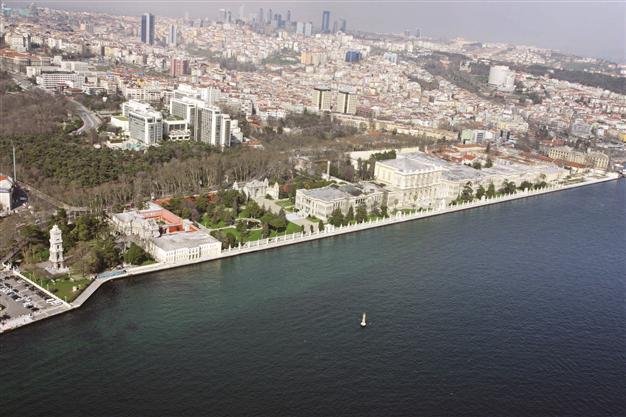Palace’s collapse risk debated
ISTANBUL - Hürriyet Daily News

The Dolmabahçe Palace, built between in 1856, is located in Istanbul’s Beşiktaş district. The founder of the Turkish Republic, Mustafa Kemal Atatürk, spent his last days there before he passed away. DAILY NEWS photo, Emrah GÜREL
An Istanbul-based academic research center’s report, which claimed that “the historic Dolmabahçe Palace is at risk of collapsing at any moment,” has been rebuffed by officials from the National Palaces Department of Museums and Promotion.
Officials from the department immediately refuted the report, which said the historic palace was close to “exploding” because of coal gas compression.
An official from the Dolmabahçe Place administration said the report was totally “fabricated.”
“Aydın University and Assistant Professor Kubilay Kaptan, who prepared the mentioned report, did not carry out scientific research. The claims that the sewer pipes under the palace are full of coal gas are totally unrealistic,” an official statement issued yesterday by the National Palaces Department of Museums read.
The report, prepared by assistant professor Kubilay Kaptan from the Hazards Education, Application and Research Center of Istanbul Aydın University, said the Dolmabahçe Palace - built between the years 1843 and 1856 - was one of the most risky buildings in Istanbul and required immediate renovation.
“The report listed the buildings currently at risk in Istanbul, and Dolmabahçe Palace is at the top of that list. Considering the current situation of the palace, even driving one nail could cause a disaster,” Kaptan told the Daily News yesterday.
Kaptan also said a real danger came from the structures built around the palace, such as the Swiss Hotel Bosphorus, the Ritz-Carlton and the Beşiktaş İnönü Stadium.
“These buildings cause land pressure on the palace, which was built on a filled area,” Kaptan said. “In the event of a possible earthquake, a disaster is inevitable for Dolmabahçe Palace.”
However, officials from the National Palaces department said earthquake hazard analysis at the palace was held annually, and that necessary measures were always taken. Nevertheless, an official from the press office also agreed with the report that the hotels and the stadium increased the risks for the palace.
“Since Dolmabahçe was built on a filled area, any renovation attempt at the İnönü Stadium would cause a disaster for the palace,” the official added.
Daily Vatan reported yesterday that “the coal gas could cause an explosion at any time.” However, both sides said the newspaper’s report did not accurately reflect the truth.
The founder of the Turkish Republic, Mustafa Kemal Atatürk, spent the last days of his medical treatment at Dolmabahçe Palace, and he passed away there in 1938.
